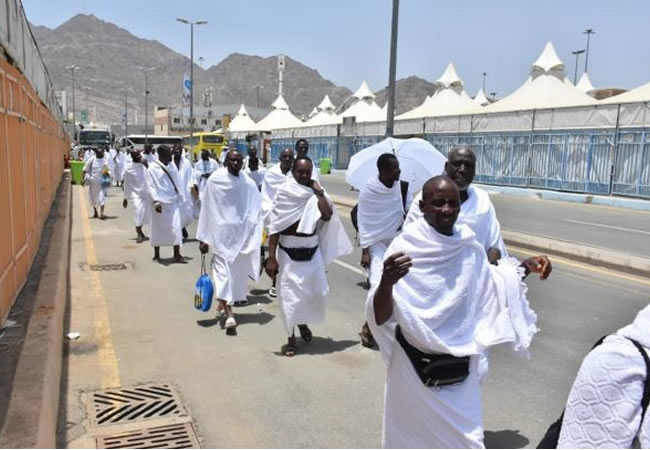The annual Hajj pilgrimage, a cornerstone of the Islamic faith, draws millions of Muslims from across the globe to the holy city of Mecca in Saudi Arabia. This year, Saudi authorities have implemented stringent measures to manage the influx of pilgrims and ensure the safety and security of all participants. A key focus has been on preventing unauthorized individuals from entering Mecca and participating in the Hajj without the required permits. Authorities reported that over 269,000 people without valid permits were intercepted and prevented from entering the city, a testament to the rigorous enforcement of regulations. This proactive approach aims to control overcrowding, mitigate potential risks, and enhance the overall pilgrimage experience for those who have obtained the necessary authorizations.
The Saudi government’s commitment to maintaining order and safety during the Hajj extends beyond just preventing unauthorized entry. Significant penalties, including substantial fines of up to $5,000 and potential deportation for foreign nationals, have been established to deter violations. Over 23,000 residents who breached Hajj regulations also faced penalties, and the licenses of approximately 400 Hajj service providers were revoked for non-compliance. These actions underscore the seriousness with which Saudi authorities are addressing the issue of unauthorized participation and the importance they place on upholding the sanctity and security of the pilgrimage. The message is clear: adherence to regulations is paramount, and those who disregard them will face consequences.
The stringent measures implemented this year are partly a response to the challenges encountered during previous Hajj pilgrimages. Last year, a number of fatalities occurred, particularly during periods of extreme heat. Government investigations revealed that a significant proportion of those who perished were unregistered pilgrims, highlighting the vulnerability of this group and the potential risks associated with unregulated participation. This year, with approximately 1.4 million authorized pilgrims already in Mecca and more expected to arrive, the focus on controlling access and ensuring adherence to safety protocols is even more critical.
In addition to traditional security measures, Saudi authorities are leveraging technology to enhance surveillance and crowd management during the Hajj. For the first time, drones have been deployed by the Saudi Civil Defence. These unmanned aerial vehicles are being utilized for a range of purposes, including monitoring crowd movements, conducting surveillance operations, and even assisting in firefighting efforts. This integration of technology reflects a proactive approach to managing the complexities of a large-scale event like the Hajj and demonstrates a commitment to leveraging modern tools to enhance safety and security.
The Hajj, one of the five pillars of Islam, is a deeply significant religious obligation for Muslims. It is a journey undertaken at least once in a lifetime by those who are physically and financially capable. This year’s pilgrimage is taking place amidst high temperatures, adding another layer of complexity to the already demanding journey. The combination of extreme heat and the physical exertion required during the Hajj rituals poses a significant health risk, particularly for vulnerable individuals. Therefore, the Saudi government’s focus on safety and crowd management is crucial in mitigating these risks and ensuring the well-being of all pilgrims.
The Saudi authorities’ comprehensive approach to managing this year’s Hajj, encompassing stringent entry controls, robust enforcement of regulations, and the innovative use of technology, underscores their commitment to providing a safe and secure environment for pilgrims. The emphasis on preventing unauthorized participation, coupled with the deployment of drones and other technological tools, represents a significant step towards mitigating potential risks and ensuring a smooth and organized pilgrimage experience. The Hajj is a deeply spiritual journey for millions of Muslims, and the Saudi government’s efforts aim to facilitate this sacred journey while prioritizing the safety and well-being of all participants.


